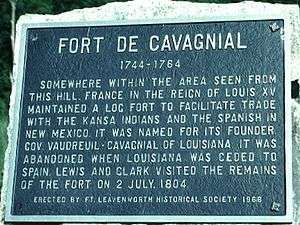Fort de Cavagnial
| Fort de Cavagnial | |
|---|---|
| Kansas City, Kansas | |
 | |
| Type | Fort |
| Site information | |
| Controlled by | New France; Spain |
| Site history | |
| Built | 1744 |
| In use | 1744-1764 |
Fort de Cavagnial (also known as Fort Cavagnolle or Post of the Missouri or Fort de la Trinité) was a French fort on the Missouri River somewhere north of Kansas City, Missouri and Fort Leavenworth, Kansas from 1744 until about 1764.
The fort named for Louisiana Governor Marquis de Vaudreuil-Cavagnial, was the furthest west on the Missouri at the time. Its first commandant was François Coulon de Villiers who came from an illustrious New France military family (the slaughter of his brother Joseph Coulon de Jumonville while in the custody of George Washington was to ignite the French and Indian War and another brother Louis Coulon de Villiers was the only commander to whom Washington ever surrendered).
Like many frontier forts it doubled as a trading post operated by Joseph Athanase Trottier dit Desruisseaux (Joseph Deruisseau) born 10 May 1709 at Lachine, QC, Canada and died Jan 1767 at New Orleans, Orleans, LA (Bayou St-John) his Father and Mother were Joseph Trottier dit Desruisseaux and Marie Francoise Cuillerier. Joseph who had a monopoly on trade on the Missouri from January 1, 1745 to May 20, 1750.[1] It was described as:
- a small but substantial fort with a surrounding stockade of stout piles and with bastions at each of the four stockade corners. Internal buildings included a commandant's house, a guardhouse, a powder house, a trader's house, and a house for the trader's employees. The buildings were constructed of logs and most were covered with mud.[2][3]
The exact location of the fort is not known because of conflicting reports about its relationship to trade with the Kansa tribe. British reports placed it below the confluence of the Kansas River and Missouri in what is today Kansas City. It appears as a placename at the confluence in the USGS database.
However, most reports place it on the bluffs above the confluence of Salt Creek and the Missouri River just north of modern day Fort Leavenworth. This was a site of a major Kansa village. Lewis and Clark reported visiting the site there on July 2, 1804:
- the French formerly had a fort at this place, to protect the trade of this nation, the Situation appears to be a verry elligable one for a Town, the valley rich & extensive, with a Small Brook Meanding through it and one part of the bank affording yet a good landing for boats
The explorer Stephen Harriman Long described it in 1819 at the location.
The fort was abandoned by France after the Louisiana Territory was ceded to Spain in the treaties concluding the French and Indian War.
References
Internal links
External links
Coordinates: 39°06′24″N 94°40′35″W / 39.1067°N 94.6764°W